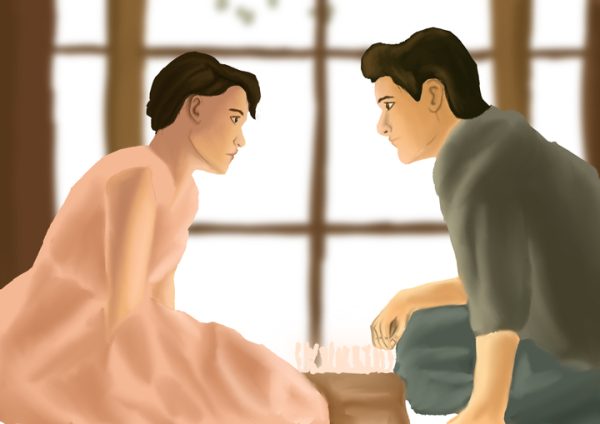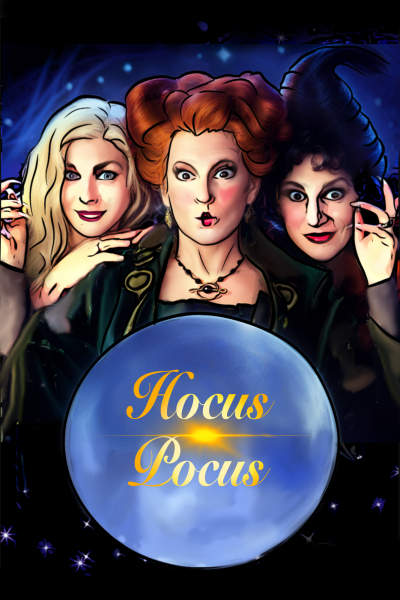“Little Women” Review
* This review contains major spoilers — and I mean major — for both the book and the movie. Beware or be square.
Honestly, what’s the point in watching a movie if you didn’t read the book first? If you’re lazy, you might look at the dozens of chapters of Louisa May Alcott’s “Little Women” and think come on, this book is older than the light bulb, why should I waste my time reading it first? Ultimately, though, I thought it was definitely worth reading before seeing Greta Gerwig’s 2019 movie adaptation, especially with how she switches around the film’s timeline.
The movie opens with a quick image of a red leather book with “Little Women by L. M. Alcott” on the front cover, followed by a scene of the main protagonist, Jo March, asking her editor how much he will pay for her story. Within minutes, I was confused, since this scene isn’t supposed to happen until seven years after the start of the story. Luckily, these jumps in time were easy enough to get used to, since they happened so often. Generally, Gerwig’s new timeline is purposeful, which outweighs my initial confusion. One timeline-related choice I felt had a clear meaning was introducing Beth’s death towards the beginning of the film.
As the movie progresses, we learn more about how this happens and can more easily recognize what would otherwise be considered foreshadowing. Since I read the book, I was able to pick up on the more subtle hints, like the shot of Beth walking into a small wood house. Readers would know that Beth was going there to care for a neighbor’s sick baby, from whom she contracts scarlet fever. Although we do get more of Beth through other scenes, the book does a much better job at showing her personality. However, the movie was able to capture the cute friendship between Beth and Mr. Laurence, who lives across the street with his grandson Laurie.
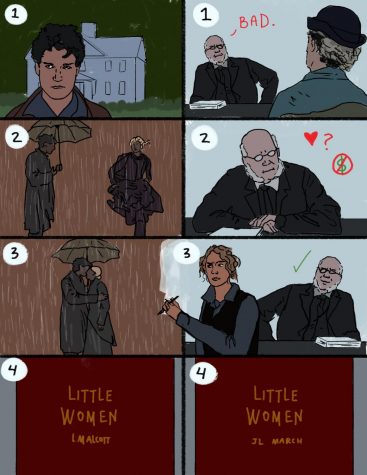
The ending of Gerwig’s “Little Women” adaptation hinted at Alcott’s publishing experience.
What really separated Gerwig’s “Little Women” from its countless other adaptations was the ending. May I just say, wow. The story by this point has stopped its skipping about in time, and seems to be on track to a neatly wrapped-up happy ending. At least, that’s what I assumed if the film was to continue mirroring the book. It started out similarly: Professor Bhaer, a man Jo met while in New York and with whom she had a close relationship with (they lived in the same boarding house working with the same children, him as a teacher and her as a governess), visited the March family for awhile after Jo returned home. This took place after Amy and Laurie got married. When it was time for Bhaer to leave, the book and movie versions diverged. In Alcott’s “Little Women,” Jo and Bhaer ended up getting married and starting a boarding school for boys in Aunt March’s house, which she left to Jo in her will. Alcott actually wanted Jo to remain single forever and to continue writing, but her publisher pressured her to marry off her protagonist. Gerwig’s version nods to this at the end of the film, when the screen switches between Jo sitting at the editor’s office negotiating about her new novel. The editor is adamant about Jo marrying off her story’s main character, and while Jo is very much against this idea, she ultimately compromises, keeping her copyrights and receiving a higher percentage of the book’s royalties.
The story continues to switch between the normal timeline and Jo sitting with her editor. The normal timeline shows snapshots:
- Bhaer is at the March’s house saying that he wouldn’t move to California if someone gave him a reason to stay,
- Jo lets him leave because she doesn’t wish to marry
- The March family tells her that no, she’s in love and must chase after him.
- Finally, Jo finds Bhaer at the train station and the two share a romantic kiss in the rain.
These moments seem to get increasingly romantic the longer Jo and her editor discuss her novel, hinting that this happy ending may be a work of fiction within a work of fiction. The film closes with Jo seeing her book being printed, and the final image of the screen is the same red leather “Little Women” book, this time with J. L. March as the author. Gerwig was extremely clever in how she decided to end this, and the final minutes are what made the movie stand out from other adaptations.
Your donation will support the student journalists of Kirkwood High School. Your contribution will allow us to purchase equipment and cover our annual website hosting costs.
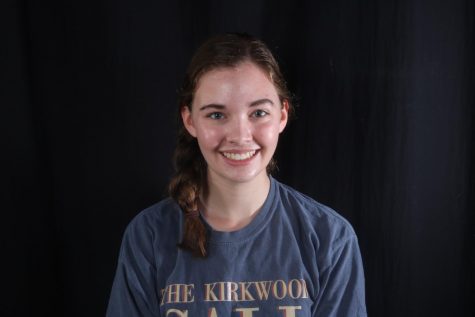
Interests: Photography/editing photos, graphic design, reading, and spending time outdoors.
Favorite musical artist: Shawn Mendes.
Favorite quote:...
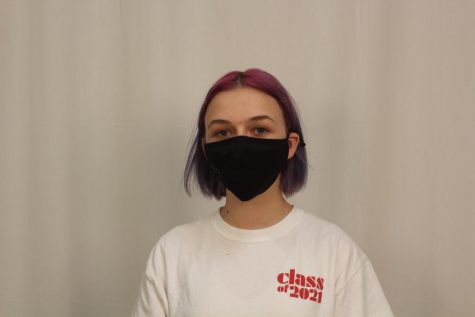
she/her
Favorite musical artist: The 1975
Favorite quote: “Don't bother just to be better than your contemporaries or predecessors. Try to be better...










